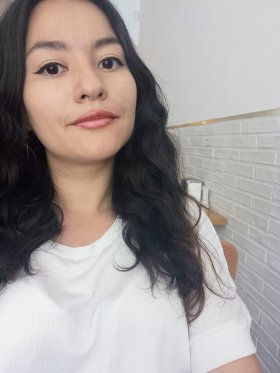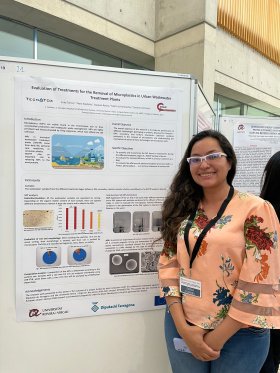Erika Amparo Torres Reyes


PhD Programme: Nanoscience, Materials and Chemical Engineering
Research group: CatHeter – CATálisis HETERogénea & TecnaTox – Centre for Environmental, Food and Toxicological Technology)
Supervisors: Sandra Contreras Iglesias & Marta Schuhmacher Ansuategui
Bio
Erika holds a Bachelor's Degree in Environmental Chemistry (2013) and a Master's Degree in Environmental Sciences and Technologies (2021), both obtained at Universidad Santo Tomás (Colombia). She worked on different research areas and projects, two of these projects were partially financed by COLCIENCIAS (also known as Minciencias, which is the Administrative Department of Science, Technology, and Innovation of Colombia). During her academic career, she developed the necessary skills to work in degrading pollutants found in different environmental matrices, she is one of the authors of the paper "Formation of hydroxyl radicals by α-Fe2O3 microcrystals and its role in photodegradation of 2,4-dinitrophenol and lipid peroxidation", published in 2018 (Journal Research on Chemical Intermediates). Currently, she is pursuing a Ph.D. at URV related to microplastic removal and degradation, focused on wastewater treatment plant applications.
Project: Evaluation of Treatments for the Removal of Microplastics in Urban Wastewater Treatment Plants
Microplastics have become a major cause of concern in the last decades because of their widespread distribution, small size, persistence, bioaccumulation, uncontrolled introduction into the environment, and its effects and the effects of their additives over a diverse range of organisms. Wastewater treatment plants are considered one of the major sources of introduction of microplastics into aquatic environments (water) and agricultural soils (sludges). Microplastics in municipal wastewater treatment plants come from daily life, personal care, medicines, or consumer plastics. Due to the microplastics affectation to living organisms, the overall objective of this research is to study the performance of different technologies (primary, secondary, and tertiary treatments) in the removal of microplastics, and understanding the mechanism of action of these technologies on microplastic parts. A special focus will be given to the application of advanced oxidation processes (Fenton, ozonation and O3/H2O2, UV/H2O2, photocatalysis) as tertiary treatments.
Outreach activities
- European Researchers' Night 2023: "Ocean Guardians: explorant els microplàstics i protegint els nostres amics marins".
- European Researchers' Night 2023. European Corner: “Evaluation of Treatments for the Removal of Microplastics in Urban Wastewater Treatment Plants”.



